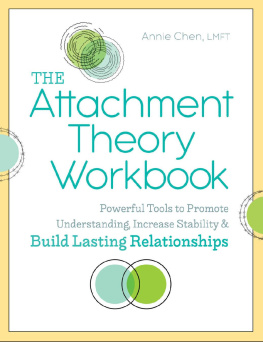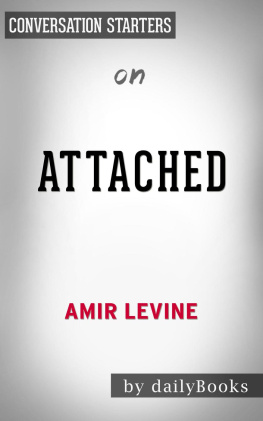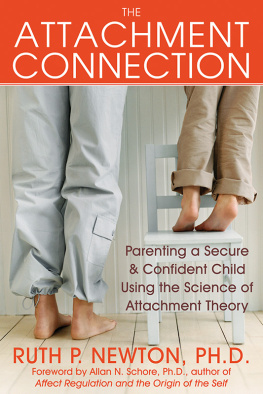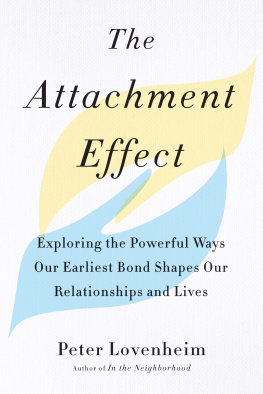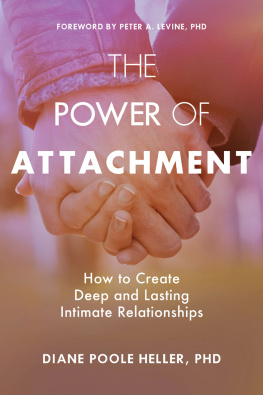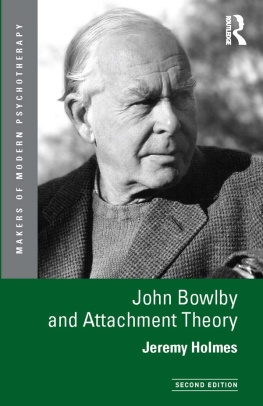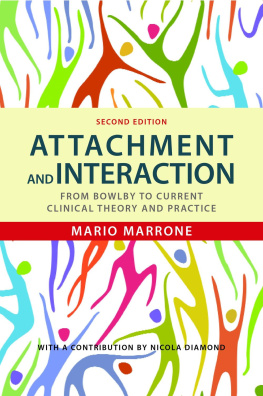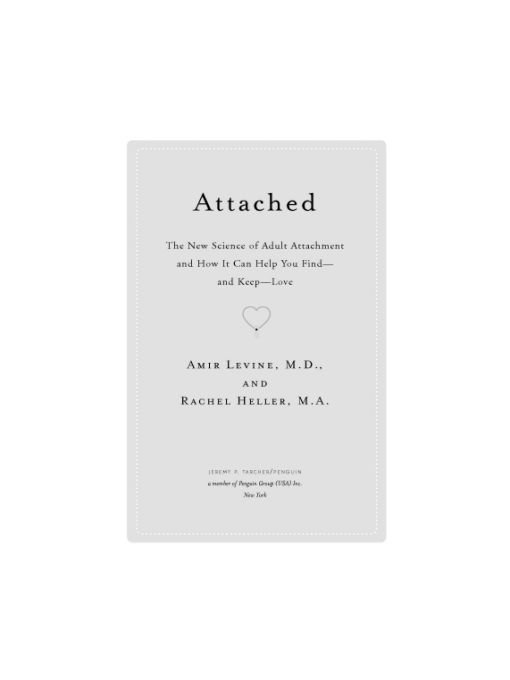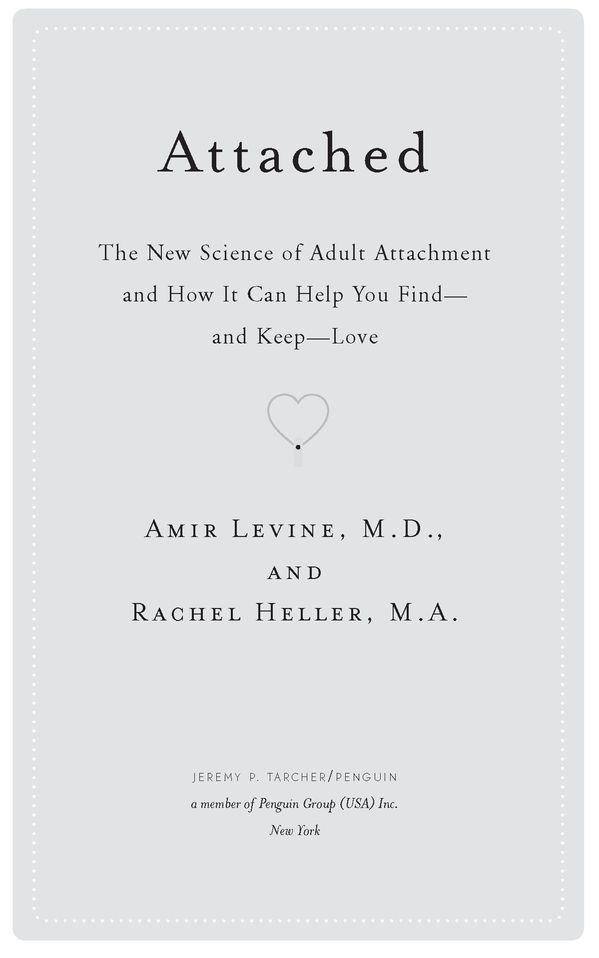Table of Contents
To my father, who taught me how to dive into
the biggest waves, and to my mother, who made
scientific discovery part of growing up
A.L.
To my family
R.H.
INTRODUCTION
The New Science of Adult Attachment
Decoding Relationship Behavior
Only two weeks into dating this guy and already Im making myself miserable worrying that he doesnt find me attractive enough and obsessing about whether or not hes going to call! I know that once again Ill manage to turn all my fears about not being good enough into a self-fulfilling prophecy and ruin yet another chance at a relationship!
Whats wrong with me? Im a smart, good-looking guy with a successful career. I have a lot to offer. Ive dated some terrific women, but inevitably, after a few weeks I lose interest and start to feel trapped. It shouldnt be this hard to find someone Im compatible with.
Ive been married to my husband for years and yet feel completely alone. He was never one to discuss his emotions or talk about the relationship, but things have gone from bad to worse. He stays at work late almost every weeknight and on weekends hes either at the golf course with friends or watching the sports channel on TV. Theres just nothing to keep us together. Maybe Id be better off alone.
Each of these problems is deeply painful, touching upon the innermost core of peoples lives. And yet no one explanation or solution fits the bill. Each case seems unique and personal; each stems from an endless number of possible root causes. Deciphering them would require a deep acquaintance with all the people involved. Past history, previous relationships, and personality type are just a few of the avenues that a therapist would need to pursue. This, at least, is what we, as clinicians in the field of mental health, were taught and believed, until we made a new discoveryone that provided a straightforward explanation for all three problems described above and many more. The story of this discovery, and what came after it, is what this book is about.
IS LOVE ENOUGH?
A few years ago, our close friend Tamara started dating someone new:
I first noticed Greg at a cocktail party at a friends house. He was unbelievably good-looking, and I found the fact that I caught his eye very flattering. A few days later we went out for dinner with some other people, and I couldnt resist the glimmer of excitement in his eyes when he looked at me. But what I found most enticing were his words and an implicit promise of togetherness that he conveyed. The promise of not being alone. He said things like Tamara, you dont have to be home all by yourself, you can come and work over at my place, You can call me any time you like. There was comfort in these statements: The comfort of belonging to someone, of not being alone in the world. If Id only listened carefully, I could have easily heard another message that was incongruent with this promise, a message that made it clear that Greg feared getting too close and was uncomfortable with commitment. Several times hed mentioned that hed never had a stable relationshipthat for some reason he always grew tired of his girlfriends and felt the need to move on.
Though I could identify these issues as potentially problematic, at the time I didnt know how to correctly gauge their implications. All I had to guide me was the common belief that many of us grow up with: The belief that love conquers all. And so I let love conquer me. Nothing was more important to me than being with him. Yet at the same time the other messages persisted about his inability to commit. I shrugged them off, confident that with me, things would be different. Of course, I was wrong. As we got closer, his messages got more erratic and everything started to fall apart; he began telling me that he was too busy to meet on this night or that. Sometimes hed claim that his entire work week looked crazy and would ask if we could just meet on the weekend. Id agree, but inside I had a sinking feeling something was wrong, but what?
From then on I was always anxious. I was preoccupied with his whereabouts and became hypersensitive to anything that could possibly imply that he wanted to break up. But while Gregs behavior presented me with ample evidence of his dissatisfaction, he interspersed pushing me away with just enough affection and apologies to keep me from breaking up with him.
After a while, the ups and downs started to take a toll and I could no longer control my emotions. I didnt know how to act, and despite my better judgment, Id avoid making plans with friends in case he called. I completely lost interest in everything else that was important to me. Before long the relationship couldnt withstand the strain and everything soon came to a screeching halt.
As friends, we were happy at first to see Tamara meet someone new that she was excited about, but as the relationship unfolded, we became increasingly concerned over her growing preoccupation with Greg. Her vitality gave way to anxiousness and insecurity. Most of the time she was either waiting for a call from Greg or too worried and preoccupied about the relationship to enjoy spending time with us as she had done in the past. It became apparent that her work was also suffering, and she expressed some concern that she may lose her job. We had always considered Tamara to be an extremely well-rounded, resilient person, and we were starting to wonder if we were mistaken about her strength. Although Tamara could point out Gregs history of being unable to maintain a serious relationship and his unpredictability, and even acknowledged that she would probably be happier without him, she was not able to muster the strength to leave.
As experienced mental-health professionals, we had a hard time accepting that a sophisticated, intelligent woman like Tamara had so derailed from her usual self. Why was such a successful woman acting in such a helpless way? Why would somebody whom weve known to be so adaptive to most of lifes challenges become powerless in this one? The other end of the equation was equally puzzling. Why would Greg send out such mixed messages, although it was clear, even to us, that he did love her? There were many possible complex psychological answers to these questions, but a surprisingly simple yet far-reaching insight into the situation came from an unexpected source.
FROM THE THERAPEUTIC NURSERY TO A PRACTICAL SCIENCE OF ADULT LOVE
At about the same time that Tamara was dating Greg, Amir was working part-time in the Therapeutic Nursery at Columbia University. Here, he used attachment-guided therapy to help mothers create a more secure bond with their children. The powerful effect that attachment-guided treatment had on the relationship between mother and child encouraged Amir to deepen his knowledge of attachment theory. This eventually led him to a fascinating discovery: as research findings first made by Cindy Hazan and Phillip Shaver indicated, adults show patterns of attachment to their romantic partners similar to the patterns of attachment of children with their parents. As he read more about adult attachment, Amir began to notice attachment behavior in adults all around him. He realized that this discovery could have astounding implications for everyday life.



